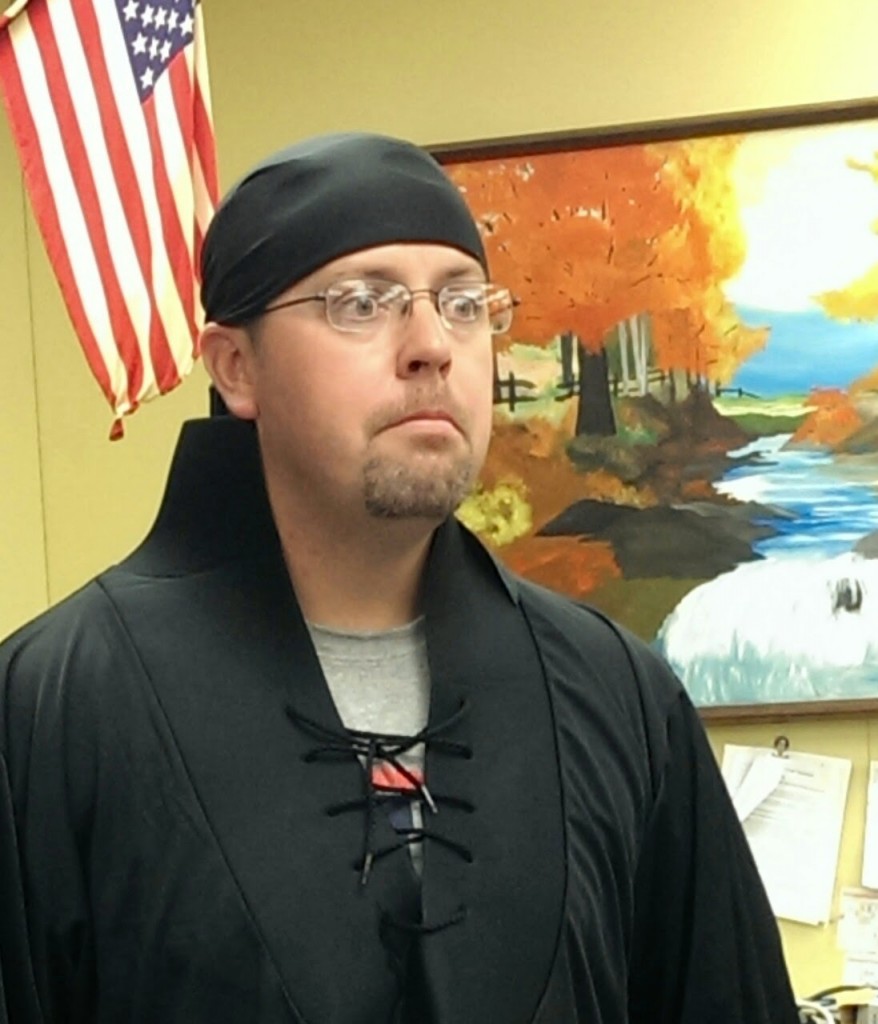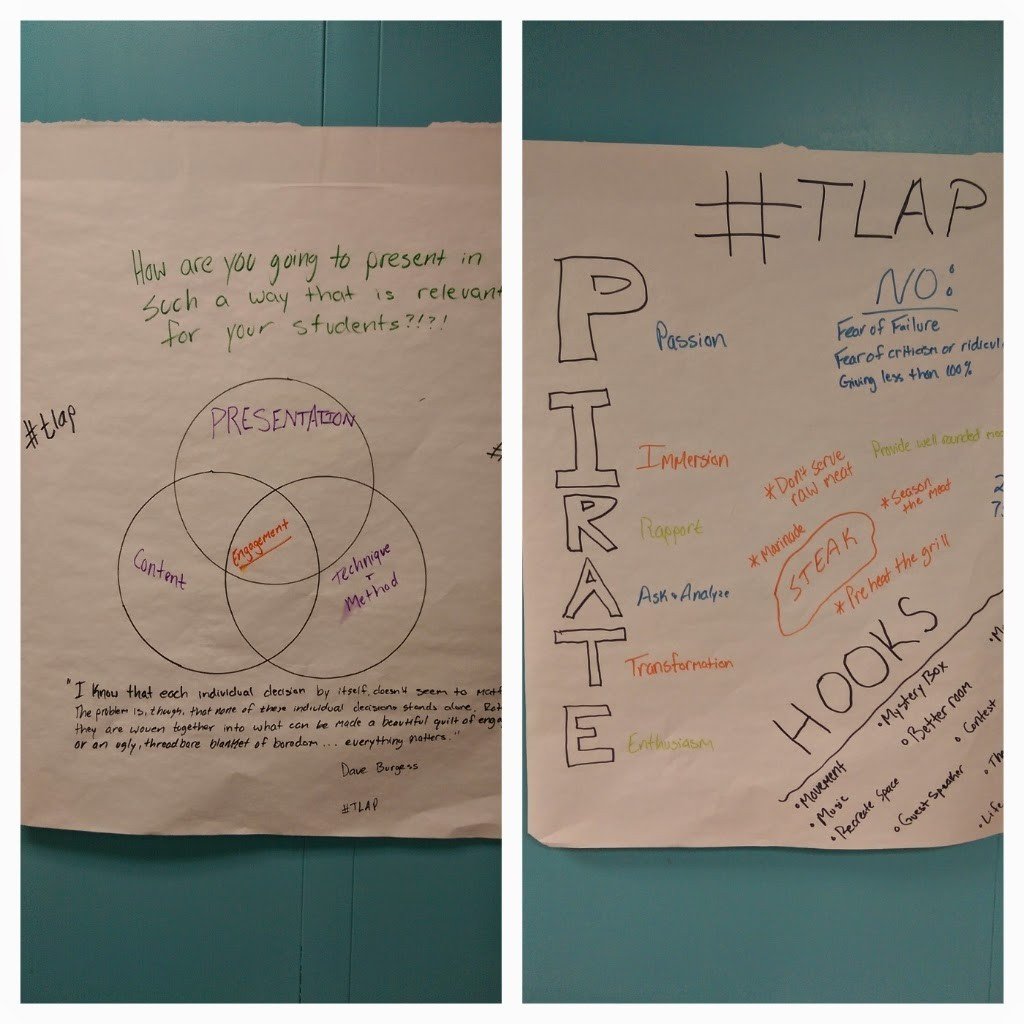I have put considerable thought into this post. I’ve avoided it for weeks. I was reminded recently of what Dr Brad Gustafson said about blogging in his interview with EdTech magazine:
I don’t want this post to be negative, though it may sound that way to some. I hope it ultimately makes a difference. That’s why I do the things I continue to do; to make a difference.
I have been a connected educator for almost three years now and the evidence can be seen by observing my practice, reading my blogs, and viewing my digital footprint on Twitter. I’ve also endured a rather trying year, professionally. This post will hopefully reflect the frustrations I have about being a reflective connected educator stuck in a school and evaluation system that does little to empower educators to become better. Sadly, it feels like there’s no room for an educator who has a passion for learning.
During this school year I’ve engaged in the following learning opportunities:
- moderated and designed questions and topics for #wvedchat
- visited Beaver Local Schools to participate in their day-long CE session with Dave Burgess: Teach Like A Pirate
- completed the following webinars with Alliance for Excellent Education
- My wife and I hosted the 2nd annual state-wide Edcamp event in Parkersburg, WV.
- I read the book Teach Like A Pirate and began incorporating the questions into my lesson plans. I also made the TLAP philosophy a part of my classroom


- I read the book by Eric Sheninger titled Digital Leadership: A Changing Paradigm for Changing Times
- Eric supported me in developing a week-long graduate course I taught over the summer for RESA V
- My wife and I attended Edcamp Columbus for the second year in a row
- I participated in Connected Educators Month by participating in a Google Hangout sharing my story of how I became connected and what it has done for my practice
- In an effort to start having conversations about instructional practice with educators inside my school building I attempted to start a weekly morning meeting. The attempt was not embraced by enough staff members to keep it going. Thank you to those who came. As Todd Whitaker says, “nothing happens at random in great schools”.
I also continued to document my progress in refining my assessment practices to better communicate student learning. Throughout this process, I began to move my classroom towards becoming paperless. I incorporated more digital tools to provide me more formative feedback about my students (Kahoot, Nearpod). Most importantly, I did something about that feedback. I have participated in countless Twitter chats on topics including leadership, blended learning, professional development, family-community engagement, and building relationships, just to name a few.
I’ve written before about how isolation is now a choice educators make. Every day I choose to connect with other educators, whether it be through Twitter, Yammer, Facebook, or Google+. Yet, I still feel tremendously isolated because there are so few educators in my area engaged in the conversations of growth and development that I choose to be a part of so often. Note: my wife, Julie, is also a connected educator engaging in her own opportunities for growth and development. We often share a lot of these opportunities through conversations at home. The isolation, though, was exacerbated during my end-of-the-year evaluation with my administrators. Not a single thing in this post was discussed during my evaluation. None of the efforts I’ve made to improve my practice were acknowledged during the course of my evaluation. I want to confess that I don’t engage in those efforts listed above for higher pay, awards, or notoriety. My investment in growth and development is done simply because I want to be the best educator that I can be. I want to provide my students the highest quality experiences during their year with me. However, it was very defeating leaving my evaluation questioning why anyone else would want to engage in similar opportunities. Telling my story and sharing the tremendous value in these learning opportunities with others has provided little benefit in the eyes of my bosses. I have a tremendous PLN and certainly don’t take them for granted, but it’s extremely lonely being in a school with little growth and development every year. I was disappointed that my efforts to grow and improve my practice went unrecognized by my administrators and the evaluation system. Aside from my self-evaluation where I filled boxes with typed narratives attempting to provide “evidence” of my own evaluation, I feel like I made zero progress in the eyes of those ahead of me. My students low standardized test scores were acknowledged during my evaluation, perhaps indicating that I’m wasting my time investing in the opportunities for growth listed above.
What reason do other educators in my area have to engage in opportunities for growth, reflection, and learning? There aren’t any administrators sharing their story of how the investment is changing their practice. The evaluation system provides little to no recognition of your efforts to improve. The only standard of measurement, that one data point measured by standardized tests, may be the only story ever heard by those above you.
I work in a school building that has almost zero conversations about improving instructional practice. As a result, I appreciate the amount of opportunities I get to engage in those conversations online. I apologize for the negativity in this post and do not intend to offend anyone. I hope this post results in much needed change. A change that empowers others to begin adopting a growth mindset. I hope the change allows others to be recognized for their attitude and actions towards growth and development. I hope my own fire is not extinguished but until my family can afford to move, I’m struggling to justify the burn. For those that are offended, consider these questions:
- What opportunities did you leverage to improve your practice?
- What are you doing to empower others to learn, reflect, and grow?
- Who do you have in your professional learning network that is better than you?
- How do you engage in professional conversations with other educators?
- What evidence of continuous improvement can you point to this school year?


Do what you do to make yourself happy. Looking for approval from others is giving your power away. Since they are looking for improved test scores, I would think you would want to see your students improve from your learning, so plan to make that happen as a personal challenge to yourself. You should be learning to improve your teaching and seeking proof that your efforts are working. If you see your students growing so will others and maybe that will even be reflected in your evaluations.
I’ll take such wise thought for myself too. Thanks!
Do not give up struggling against mediocrity!
Derek,
Your post was very interesting. I think you wrote it thoughtfully. I have been in education for over 30 years and have seen many changes, some good and many bad. I understand your frustration. Yes, it is tough being in a school system where change and growth are not recognized and appreciated. And I am sure you feel like the “Lone Ranger” at times if your colleagues are not in your same growth mindset. You have the advantage I never had when I started of connecting with likeminded educators through technology. Keep this avenue open. My best advice is “lead by example” which I am sure you are doing. Actions speak louder than words. Others will see the learning going on in your classroom and one day may want to emulate it. I found as a young teacher the more I talked about all my great new ideas, the more I alienated my fellow teachers. One day I was complaining to my husband about my supervisor not recognizing all of the new and creative things I was doing. My husband very succinctly said “If you wanted applause you should have gone into the theater.” I took his point. So please don’t get discouraged. The education you are giving to your students is the most important part of their lives. We are at a point in education where people who have no idea what good education is (state and national legislatures) are trying to put a “business model” on schools. How many widgets did you sell today? How can we up your productivity? What is the bottom line? Where is our profit? Work more with less? Only data points are important?
Hopefully the pendulum will swing back one day. Keep doing what you are doing. You are a good teacher. If you really need applause take my husband’s advice then…..quit and go into the theater.
Derek,
I always read the posts from Edublogs that arrive in my email and I ALWAYS learn something from them. This post came at a nice time. You see, I am retiring at the end of the school year. I could hang in there for a couple more years before reaching “full” retirement age. Instead, I am leaving with my integrity intact. I cannot support the educational system that seeks to duplicate classrooms and disregards the real reason we are there – the students. I know it sounds pat but our passions and gifts have no place in the classroom any more. If teaching and learning cannot be tracked by data, then it mustn’t be happening at all – or so it would seem. And put all your artifacts into your portfolios as evidence so they (admin) don’t have to actually visit and see the learning in real time. At one time, educators were treated as professionals. Now the climate puts us into remedial classes of our own. A crystal clear example is the isolation you speak of. You are pointing out the value of a professional seeking to be better at the job and enlisting the help and reflections of others as an important part of the process. I found Edublogs (and a great volunteer mentor, Sue Waters) back in 2007. There was one person in my school who connected me with Edublogs and my blogging life began. To this day, that one educator, @dogtrax, remains the only constant connected educator in my daily life. We have had conversations over the years as we tried to urge others into our “secret society” using a multitude of tools. The interest just wasn’t there. We both gave up and went about our merry ways, while finding folks occasionally in need of our connections, advice, experience, and burgeoning tech savvy. Try not to let them get you down. They are trying to survive and keep their jobs by toeing the line and doing what they are told. They are not happy in this enterprise. Educators are leading unsatisfied lives. Advice…. Grow a thick skin and be ready to move on at any time. Speaking of these issues “in public” can get you in a heap of trouble. They are watching.
Derek,
I appreciate Sue’s comments. I didn’t realize she has gone through the lonely and lack of support times too. I’ve been blessed to have at least one connected friend in most of my teaching experiences, but not many more than one. We are still a minority, I’m afraid.
Your wife left a lovely comment too. That’s your best support–having a connected friend right in the same house. May you continue to grow and connect, even when you feel alone. Know that you aren’t really alone, and your students are, as Brad Gustafson said, the great winners in your connectivity!
Blessings,
Denise
Hi Derek
I agree. It is a very thought out and balanced post.
Many connected educators like us face the same challenges.
What we do, and why we do it, isn’t necessarily recognized within our own organisations. I faced exactly the same challenges prior to doing what I now do.
I’ve been a connected educator since 2006 because I decided that while I mightn’t be always able to affect change within my own organization by sharing my learning globally it would help others. There’s been moments (many) over the years where I’ve felt like giving up — but what we do makes a difference to our students and to other educators.
I’ve also found socializing with face to face friends who are connected educators like myself helps. Every Saturday we catch up for a walk and talk. It helps me being able to socialize with those that understand me. Not having to adjust what I’m saying so the other person doesn’t look at me like I’m an alien — is sooo nice 🙂
Thanks for sharing your reflections!
Sue
Thank you Sue and Denise! I really appreciate you taking the time to comment. This area (1.5 hour radius at least) has so few connected educators. I can literally count on one hand the number of connected edus there are in my district of 27 schools. It’s as if connecting has distanced myself from my local colleagues and the leaders in my area. The few conversations that do happen in my school feel “years” behind the conversations I’ve had since connecting. I obviously have to exercise patience, compassion, and humility in dealing with the leaders and colleagues I work with, but it’s tough to do when I feel as if my reward is a slap in the face during evaluation time. I’d do almost anything to put myself in a building of like minded learners, working for a leader that leverages connections and puts a priority on being a lead learner, rather than a building manager. It’s encouraging to know the feeling exists among other connected edus. Though I’ve considered leaving education or leaving my passion of learning and connecting, I still continue to forge ahead, despite the lack of voice or vision.
Proud of you. This is a very well thought out and balanced post. It has been very obvious and clearly observed that you have made vast improvements in your classroom instruction. I still remember years ago having conversations with you about your “trade and grade with a red pen” concept, and you are soooo far removed from those practices that it’s amazing the growth you have shown. Great post…..I needed it for myself as well.